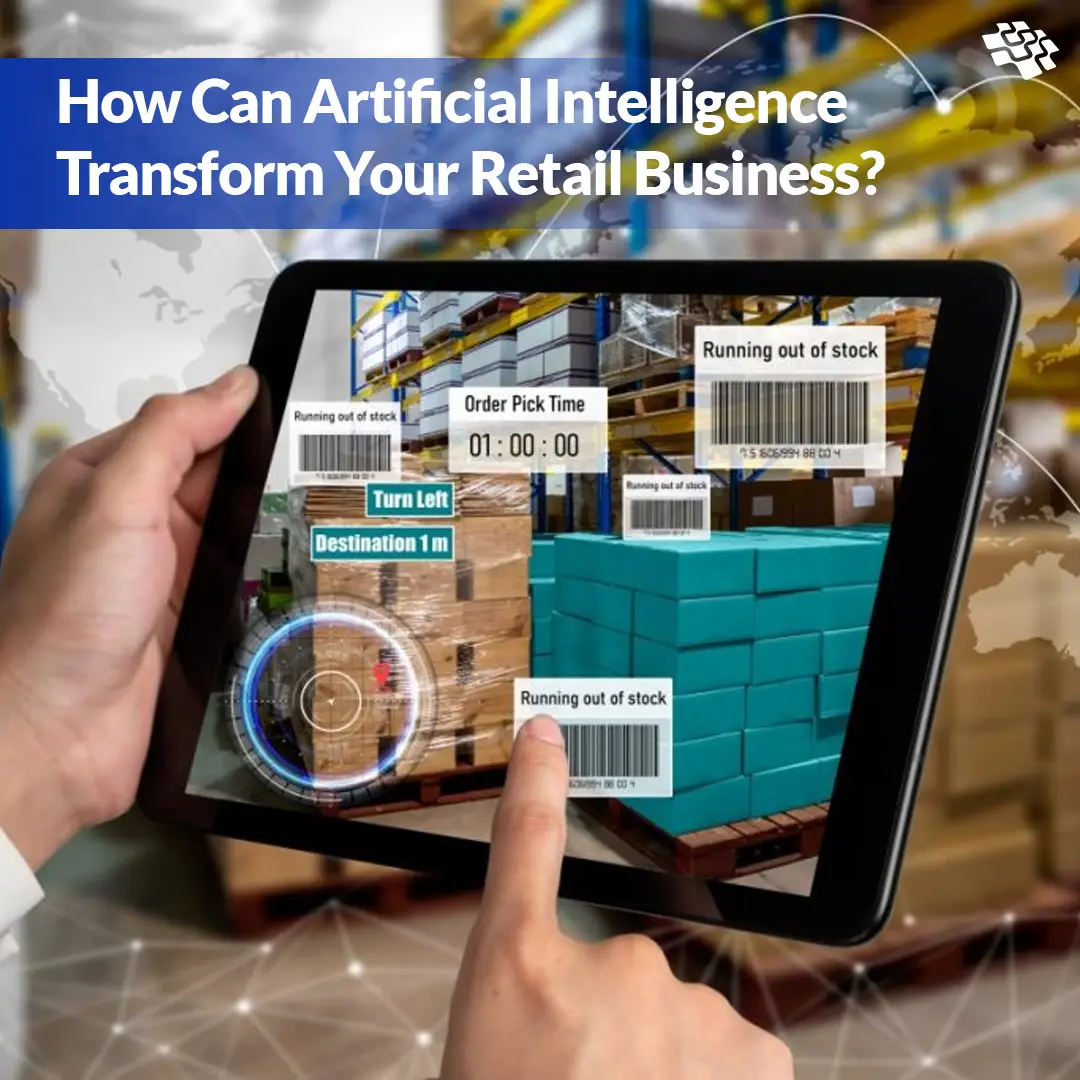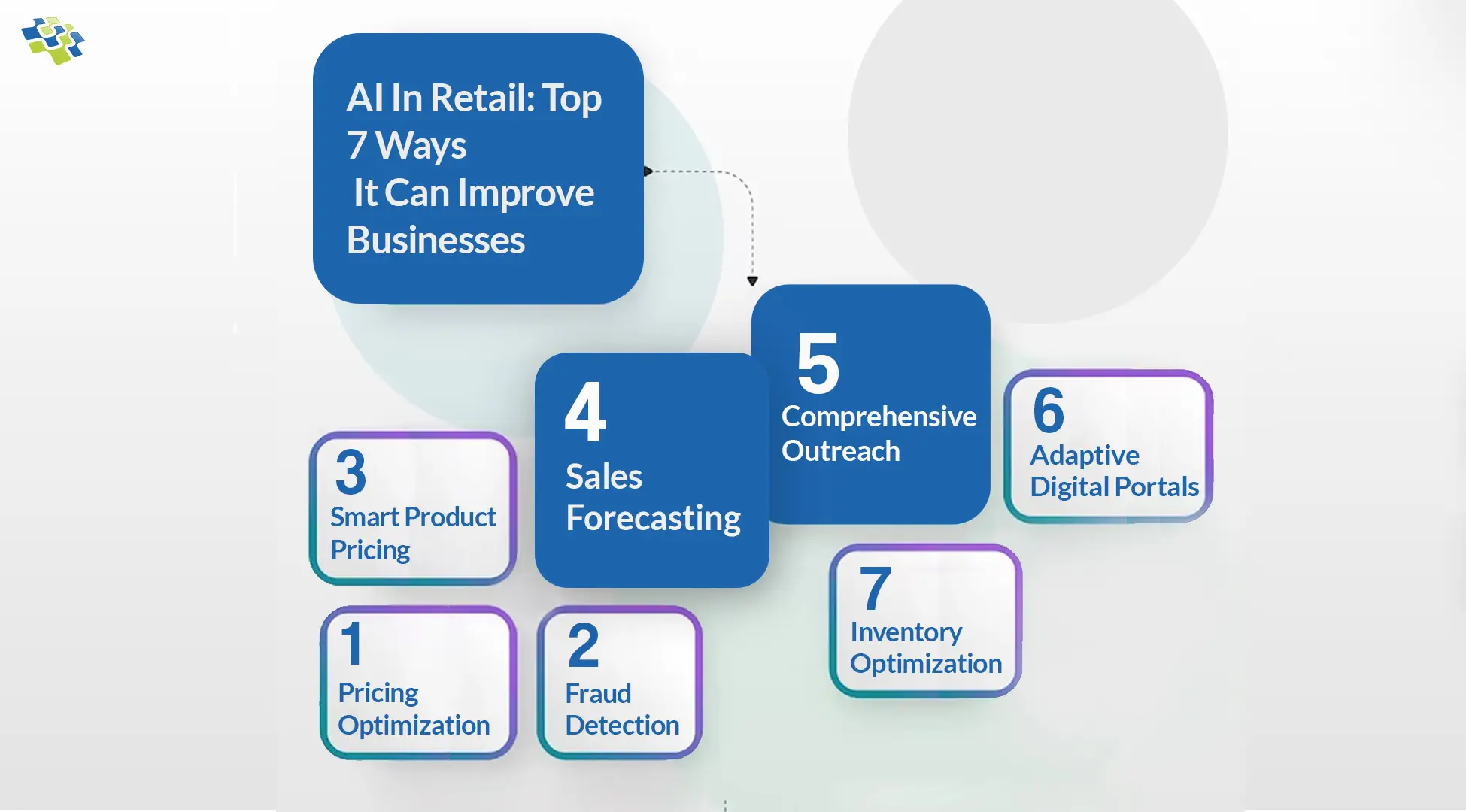How Can Artificial Intelligence Transform Your Retail Business?
AI’s impact on employment in retail is a concern. While cashiers may not be eliminated, their role is expected to evolve as AI automates some tasks like inventory tracking, freeing them up for more complex activities that require human interaction. Retail companies are becoming more interested in understanding how artificial intelligence is changing the sector as technology develops.

The global AI retail market was valued at USD 3.75 billion in 2020 and is projected to grow to USD 31.18 billion by 2028 at a CAGR of 30.5%, with an increase of USD 4.84 billion in 2021. – Fortune Business Insights
AI In Retail: Technologies & Solutions
Numerous industries use the term “artificial intelligence,” but many people are unsure of what it implies. When we refer to artificial intelligence (AI), we are referring to a range of technologies, like as machine learning and predictive analytics, that can gather, process, and analyze vast amounts of data to predict, forecast, inform, and assist retailers in making precise, data-driven business decisions.
By utilizing innovative AI analytical capabilities to transform unprocessed data gathered from the IoT (Internet of Things) and other sources into useful insights, these technologies are even capable of acting autonomously. Additionally, AI in retail makes use of behavioral analytics and consumer intelligence to improve a variety of customer care touchpoints and gain insightful knowledge about various market demographics.
Further read: Artificial Intelligence, Driving 2022 Future Business Trends
AI in Retail: Top 7 Ways It Can Improve Businesses
The traditional brick-and-mortar retail industry is facing a “Retail Apocalypse” as many businesses struggle to compete with online retail. Here are 7 ways AI can help the retail industry do better:
 1. Pricing Optimization
1. Pricing Optimization
Pricing Optimization is essential so that retailers don’t sell products below a certain price point. This not only prevents price erosion but also keep retailers from losing their much-needed profit margin to survive. There are many policies such as MAP (Minimum Advertised Price) has been established to avoid such instances. To prevent MAP violations, retailers need to monitor sellers and enforce compliance.
Artificial Intelligence in retail can be used to analyze and monitor products in real-time, enabling brands to detect and prevent MAP violations. AI-powered solutions can track pricing data from multiple sources and notify retailers of any discrepancies. With this data, retailers can act and prevent MAP violations, protecting their bottom line and brand reputation. Additionally, by assessing market trends, competition costing, and demand data, AI can assist businesses in optimizing their pricing strategy. They may be able to offer competitive prices as a result without going beyond MAP guidelines. Retailers can increase profitability and gain a competitive advantage by utilizing AI in pricing.
2. Fraud Detection
Retailers face significant losses due to shrinkage, non-scans, and other frauds, which total up to $45 billion annually. These issues not only impact a retailer’s profitability but also diminish customer trust and satisfaction. Fortunately, AI provides a straightforward solution to address the checkout problem.
AI algorithms can analyze video feeds from checkout lanes and flag instances where items are left unscanned. This helps retailers identify and prevent potential losses by quickly notifying checkout personnel to take corrective action. Additionally, AI can help scans done automatically without having to scan each item (Amazon go store is a prime example). It can assist in detecting fraudulent behavior and errors during checkout, improving accuracy, and preventing further losses.
3. Smart Product Pricing
AI is influencing retail organizations’ pricing tactics in significant ways. Retailers can accumulate, evaluate, and analyze a lot of data about their customers and competitors to determine the best prices for their products by utilizing machine learning algorithms.
Dynamic pricing is one of the AI pricing techniques that are most frequently utilized in retail. Algorithms are used in this strategy to determine the real-time price of products based on variables like client demand, inventory levels, and rival pricing. Retailers can develop unique pricing plans for each consumer by examining data on their purchasing history, browsing habits, and demographics.
4. Sales Forecasting
Retailers are revolutionizing how sales are forecasted by using AI to examine massive volumes of data and identify patterns and trends that might be invisible to the human eye. One technique used by AI algorithms to analyze previous sales data, market trends, and other pertinent data to anticipate future sales is predictive analytics. Retailers can use this information to design marketing campaigns, optimize staffing, and change inventory levels.
By examining various data sources, such as trends, social media activity, and even satellite imagery, AI is also able to predict demand for products. Retailers can increase their bottom line by anticipating trends and stocking shelves with the appropriate products at the right time.
5. Comprehensive Outreach
Modern retailers are aware of the value of sophisticated marketing tools, and CRM systems have practically permeated every aspect of retail operations. Statistics show that almost 82% of businesses utilize CRM for sales reporting.
Retailers use data to encourage outbound marketing with specialized content, incentives, and ideas. They strive to construct a thorough buyer profile based on the client’s prior preferences and behavior. With this strategy, merchants can give their customers a customized experience and improve their chances of keeping them.
6. Adaptive Digital Portals
By enabling companies to have more individualized and fulfilling relationships with their customers, AI technology is fundamentally changing the way people shop online. Today’s online shopping portals use AI’s adaptability to improve the entire purchasing process by considering customer inquiries, previous purchases, and purchasing habits to offer customized recommendations and highly dynamic displays.
As a result, companies may make the most of their digital portals to boost consumer loyalty and engagement while also boosting sales. Businesses can guarantee that their clients have a smooth and delightful purchasing experience with the use of AI-powered solutions, which will eventually help their online operations succeed.
7. Inventory Optimization
As AI provides retailers with real-time data about consumer behavior, market trends, and supply chain operations, it is revolutionizing the way retailers optimize their inventory. Retailers are accurately forecasting demand by employing AI-powered algorithms to analyze data on sales history, seasonal trends, and consumer preferences. Retailers may increase their revenue, cut costs, and deliver better customer service by utilizing AI in inventory optimization to make sure products are always available when customers need them.
By anticipating customer preferences and shopping behaviors, businesses can stock up early and efficiently, avoiding last-minute rushes and ensuring that they are well-prepared to meet demand. As a result, businesses can reduce operational costs, improve customer satisfaction, and increase sales revenue by leveraging the power of AI in their supply chain management.
Further read: Top 5 Forces Driving AI Model Development & Decision for Entrepreneurs
Challenges & Risks of AI In Retail Businesses
While AI has benefited retail businesses, there are also numerous challenges and potential threats associated with it. The possibility for wrong conclusions or judgments to be reached because of improper data or algorithms is one of the main hazards connected with AI applications. Additionally, AI systems can be used by counterfeiters to manipulate price structures or obtain unauthorized access to client data. Customers might feel uneasy about having their data gathered and analyzed by AI-driven systems without their knowledge, which raises further privacy concerns.
Another issue is the potential for AI to alter the retail industry’s competitive landscape and provide some businesses with an unfair edge. For instance, larger enterprises may be able to dominate the market and outcompete smaller businesses if they have access to more advanced AI technology and more resources, which would result in a concentration of power and market dominance.
As a result, companies must exercise caution when implementing AI technology and adopt the necessary safeguards to protect data accuracy, security, and privacy. They must also take action to support a level playing field in the retail sector and consider how AI can affect market competition.
Wrapping Up
AI has become increasingly vital in the retail sector, with applications that go beyond software, encompassing robotics and the Internet of Things. To develop such systems, multiple engineering disciplines are required, and companies that ignore these advancements may struggle to compete globally. By incorporating AI, retailers can make more informed decisions, generate greater revenue, and retain more customers. AI is transforming the way stores operate and businesses should not overlook its potential benefits. However, it is essential to consider the several ways in which AI can be integrated into retail organizations, considering data accuracy, security, and privacy concerns.
At NextGen Invent, we specialize in creating innovative AI-powered solutions for retail enterprises. By embracing the appropriate AI technology, companies can enhance their operations and achieve new levels of growth in the coming years. Thus, there is no better time than the present to incorporate AI into your business routine and reap its rewards in terms of efficiency, profitability, and customer satisfaction.
Contact us today to learn more about how we can help your business thrive in the era of AI-driven retail.
Stay In the Know
Get Latest updates and industry insights every month.
 1. Pricing Optimization
1. Pricing Optimization